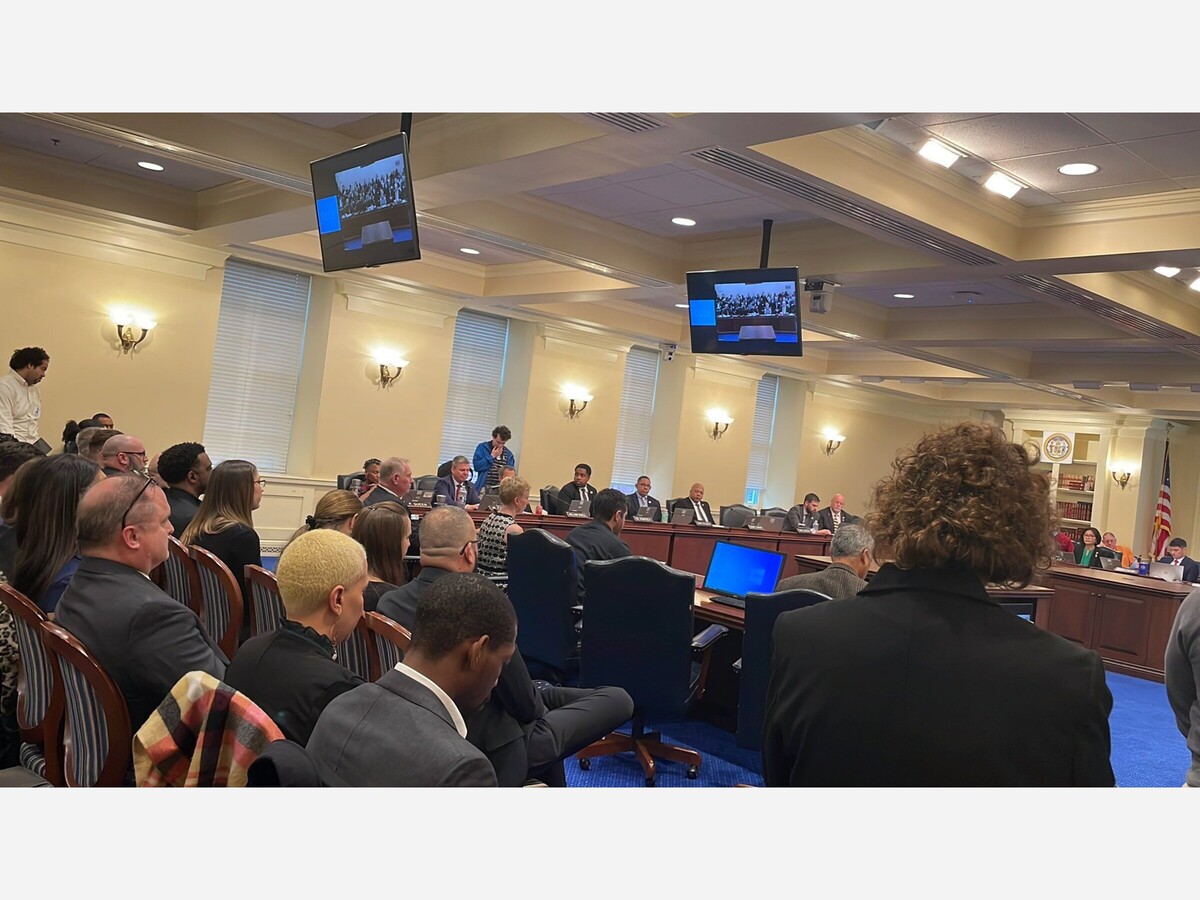Image


By Greg Morton
Capital News Service
ANNAPOLIS, Md. – More than 80 scheduled speakers converged on the House Economic Matters Committee Feb. 17 for one of the biggest days on the legislative calendar: a hearing on an emergency bill to create a legal market for cannabis in Maryland.
The speakers, some representing private industry, some speaking only on behalf of their own businesses, and others simply concerned Marylanders, came mostly to propose amendments.
The bill, a massive 88-page piece of legislation, creates a framework for the legal sale of cannabis in Maryland after voters approved legalization in November’s election. Lawmakers have made it a priority to create a regulatory structure to avoid an unregulated market when cannabis is officially legalized on July 1.
Speaking to a packed room, committee Chairman C.T. Wilson, D-Charles, said in opening remarks: “As I’ve said multiple times, I’m not here to create a cash cow for the state or just a marketplace for intoxicants. I’m here to make sure we can stop young people from being arrested and dying.”
Though much of the testimony skewed in favor of the bill overall, some sought changes related to social equity among license holders. Others proposed greater oversight, a larger share of tax revenue for localities, residents' input on retail locations and funding for legal aid in drug cases.
First access to the market
As the bill is written, current medical dispensary owners stand to be some of the first beneficiaries of the new, potentially billion-dollar, legal cannabis market in Maryland.
To ensure adequate supply when the legal market opens July 1, those who now hold licenses to sell medical cannabis will have the option to convert their licenses and be among the first to access the legal market. Though, it is unclear if Bowie-based Salvera will seek to convert its medical cannabis license to recreational use.
To curb a potential first mover advantage, the bill imposes strict limits on the number of dispensaries a medical license owner can operate, a concern for some of the more ambitious and enterprising medical operators.
“I’m really looking at opportunities to scale my business, and to be able to partner with other like-minded entrepreneurs to help them avoid some of the mistakes that I made,” said Hope Wiseman, owner of the Prince George’s County dispensary Mary & Main.
Wiseman testified in favor of amendments that would allow current medical operators to open more locations and to foster increased cooperation with the new market entrants who will receive licenses under the bill.

Threat to the hemp industry
Others in the hemp industry see the bill as a threat to business. “As this bill is written, it will literally translate to at least 100 families losing the ability to produce income,” said Derek Spruill, owner of Cherry Blossom Hemp in Silver Spring.
Hemp businesses and industry representatives worry that the bill would force many hemp-based products from shelves because of limits it would impose on THC products sold without a recreational license. THC and CBD are shorthand for the most common ingredients in marijuana, and certain hemp-based products may contain levels beyond the bill's cap, hemp industry advocates said.
“Just thinking about the tincture bottles (of CBD)... they’re absolutely going to have more than that cap in milligrams, but they’re going to be well below the federally legal 0.3% (of THC per serving),” said Elly Cowan of Compass Advocacy group, a firm that represents several members of the hemp industry. “What you have there is an issue because you’re translating something that was by volume before…into a weight,” she added.
Wilson has remained unconvinced by the industry’s arguments. “Let’s be clear... the people growing hemp, this does not affect them,” said Wilson after Wednesday’s legislative session. “The concern is that the individuals that are testifying are selling a derivative of hemp that intoxicates people.”
Cowan and other hemp industry representatives have pushed back on this accusation and urged Wilson and other committee members to reconsider. There are “bad actors” in any unregulated industry, Cowan said, but she contends her clients self-regulate, pay for their own testing, abide by current law and try to assure children do not have access to their products.
The right to organize
Union representatives, including speakers from United Food and Commercial Workers (UCFW), a labor union that represents cannabis workers in Maryland, proposed an amendment to ensure cannabis workers are covered by what is called a “peace agreement” as a condition of obtaining a license.
Peace agreements, which were also conditions of casino licensing in Prince George’s County, are meant to create more favorable conditions for unionization and to prevent some of the tactics businesses have traditionally used to stymie labor organizing.
“If the workers decided to organize, the employer would have to remain completely neutral, they wouldn’t be able to sway or influence or retaliate against their employees,” said Kayla Mock, a representative of UFCW Local 400, which represents cannabis workers in Maryland. “It would create a truly free and fair process for workers to organize,” she added.
Wilson, who notes that labor unions are not precluded from organizing under existing federal law, seemed apprehensive about including a peace order mandate in the final bill. “The government doesn’t have to get involved in every aspect of somebody’s life,” said Wilson. “Federally, you can’t stop somebody (from unionizing).”
Sen. Watson: `lot of subtle things'
Some advocates of the bill want to avoid the "unintended consequences" of legalized marijuana as seen in Colorado and California. "There are a lot of subtle things that a lot of folks have yet to really think about. And so I know that the legislators are actively researching what's been going on in Colorado and California to ensure that our bill is better," state Sen. Ron Watson (D) told the Bowie Sun earlier this month.
But he said some of the details may have to get ironed out after the July 1 deadline.
Watson, whose district includes Bowie and Upper Marlboro, won't see the cannabis bill until it comes to the Senate floor, but he was upbeat about the legislation as it moves along. "So we have a lot of work to do and we might not get it all right this session. But we'll eventually get there. And I think it'll be a good bill that benefits our area."
This story was updated Feb. 24 to include a graphic on cannabis businesses in Bowie.